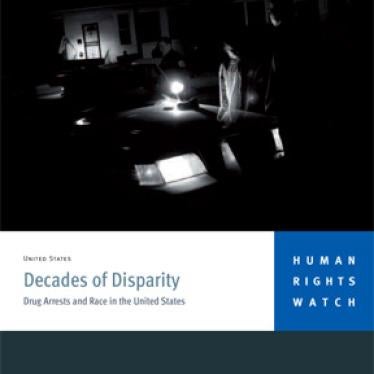(New York) - Legislation approved by the House on July 28, 2010 will dramatically alter the historically more punitive approach to federal crack cocaine offenders that led to racial disparities in sentencing, Human Rights Watch said today. The bill, which the Senate passed in March, is on its way to President Barack Obama for his signature.
"The new legislation will end the egregiously and needlessly long crack sentences that were a hallmark of federal drug sentencing," said Jamie Fellner, senior counsel in the US program at Human Rights Watch. "The racial disparities in sentencing that result from the current law are unconscionable."
Under current law, a person convicted of an offense involving possession of crack cocaine gets the same mandatory prison term as someone with 100 times the amount of powder cocaine. This 100-1 ratio meant that persons received far longer sentences for crack offenses than for powder cocaine offenses involving the same quantity of drugs.
In 2008, the average sentence for federal crack cocaine drug offenders was 114.5 months, compared with an average sentence of 91 months for federal powder cocaine offenders. The new legislation reduces the ratio to 18-to-1. The act will also eliminate the current mandatory minimum five-year sentence for simple possession of crack cocaine, which is the only federal mandatory minimum sentence for simple possession of a drug, even by a first-time offender.
Blacks have constituted the preponderance of federal crack cocaine offenders since the 100-1 differential was enacted, despite the fact that more whites used crack. In Fiscal Year 2008, 79.8 percent of federal defendants sentenced for crack cocaine offenses were black. But, according to federal drug use surveys, 27 percent of crack cocaine users were black and 65 percent were white. The disproportionate number of black drug offenders sentenced for crack cocaine offenses helps explain the far longer average sentence lengths for all black federal drug offenders: 111.5 months compared to 73.5 months.
When Congress enacted the current cocaine sentencing laws in 1986 and 1988, it was responding to extensive public concern that that crack was uniquely addictive, inherently caused violence, and, among other dire effects, yielded "crack babies." Time and science, however, demonstrated that most of the assertions about the differences between crack and powder cocaine were exaggerated, false, or simply not supported by sound evidence, Human Rights Watch said.
With the nation suffering economically, the costs of long prison sentences for low level nonviolent crack cocaine drug offenses are even harder to justify, Human Rights Watch said.
"Congress has finally listened to reason and its conscience," Fellner said. "Public safety is weakened when disproportionate crack sentences undermine faith among all races in the fairness and common sense of the criminal justice system."







